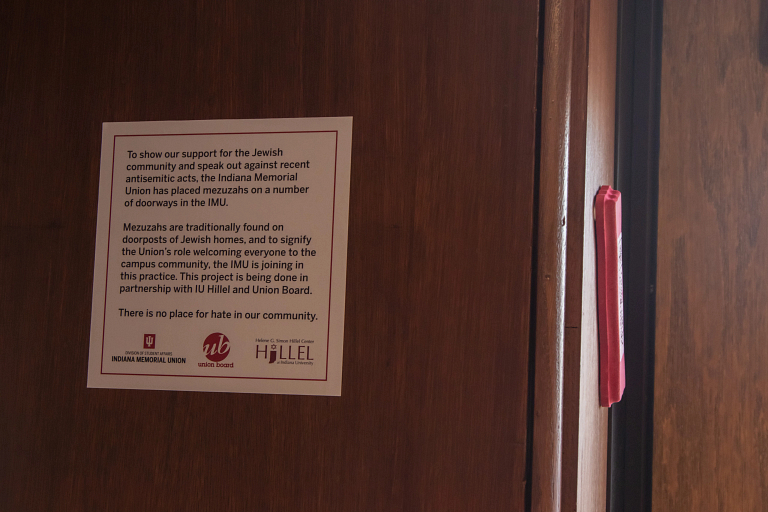Antisemitism on College Campuses
Mezuzahs put up by Indiana University in response to Antisemitism on campus
Antisemitism on college campuses is on the rise. Although antisemitism has unfortunately always been prevalent, in recent years it has worsened to an extreme degree. Antisemitism is the hostility towards the Jewish religion. This is especially relevant at Indiana University. In the past few weeks, many disturbing and false narratives about Jewish people were published on the website “Greek Rank”. In this anonymous discussion chain, several posts made horrible comments about the Jewish people on campus, inciting prejudice and hateful viewpoints to be spread.
In these posts, they mentioned that Jewish people are the worst in the world, and that they should be sent back to the concentration camps. They called Jews dangerous, warning everyone to come together to get them off of their campus. The stereotypes and falsities in these statements are disturbing and disgusting, to say the least. These viewpoints are not only being talked about behind a screen, but they are being enacted on campus. Mezuzahs are being ripped down from Jewish student’s doors. Mezuzahs are very valued and holy in Judaism, and Jewish custom is to put a mezuzah on each doorway and touch it as you walk through. A mezuzah is a piece of parchment which has Scripture written on it, and is in a small case. These two instances are just the large acts of the antisemitism on campus. Describing them does not encompass the amount of discomfort and anxiety that Jewish students may feel daily. These antisemitic actions have created a hostile and unsafe environment for Jewish attendees of Indiana, who are completely undeserving of this hate based on offensive stereotypes.
Antisemitism can be detected almost anywhere, but it is especially common at colleges. The Anti-Defamation League (ADL) explains that this happens for a variety of reasons. “As students form their sense of self at college and seek a niche in the world, some are especially vulnerable to hatemongers who either stir their developing political passions or couch bigotry in academic terms designed to appeal to their intellectual curiosity.” As students develop, it is easy for them to fall into the wrong viewpoint if they are targeted by groups spewing propaganda. For this reason, it is easy for hate to be spread and for many to blindly follow these terrible leaders.
In addition, ADL states, “controversial speech is often welcomed at universities more than in other venues; students see their campuses as havens of free expression, with the right to speak near sacred. Racists and demagogues have ably exploited schools’ commitment to free speech, cloaking their propaganda in the guise of academic freedom.” The freedom of speech applies to all people, regardless of the intent of their message. Unfortunately, anti-semites can use this right to provoke hate and not be challenged, concealing their disinformation as necessary conversation. College is a place for learning and growth, but this allows for hate to seep in, concealed. ADL further explains, “All too eager to prove their commitment to a free exchange of ideas, many students — and sadly, school administrators as well — in their idealism and naiveté, fail to distinguish adequately between debate that enriches and elevates the mind and speech that lowers the level of discourse to name-calling and lies.” Although free speech is granted to all, this does not mean that colleges should encourage it when it involves harm to specific minority groups.
While most Americans would say that Antisemitism is wrong,it is common for there to be a lack of understanding of the truth and severity of it. The ADL-Hillel Campus Antisemitism Survey: 2021 showed that 32% of Jewish students experienced direct antisemitism, and 79% of those students reported that it happened to them more than once during their school year. One-third of all Jewish students at college experience antisemitism, yet many do not even view Jews as marginalized. This is for many different reasons, including lack of information, ignorance, propaganda, and more. But for one, Jews make up roughly 0.2% of the world. There are many people who have had no exposure to Jews and are gullible to false information. The ADL says, “Among America’s students are many who grew up with little or no contact with Jews and who have a limited personal background to fall back upon when professional anti-Semites come to campus.”
Colleges need to enlighten all students so that their campus is not full of hate. Campuses are diverse, but these differences need to be celebrated instead of feared. In this day and age with media and politics, it is easy for false rhetoric to be spread, and the only way to avoid this is to educate ourselves and the ones around us. Being aware of the ways antisemitism is spread is the first step in being able to combat it.
Hate speech or actions, regardless of how small they might seem, have severe implications. In 2021, Brandeis Center surveyed members of Jewish fraternities on antisemitism. It found that in one Jewish fraternity, 64% have felt unsafe as a Jew on their campus, and 67% of another Jewish fraternity felt this same way. These concerns branch out to every aspect of their college life. In one of these Jewish fraternities, more than half of students are concerned about being verbally attacked, and one-third are concerned about being socially excluded, being bullied or harassed online, and being marginalized or penalized by a professor. Some even feel concerned about a physical attack. Moreover, half of Jewish fraternity members have felt they needed to hide their Jewish identity while on campus. As a Jewish student myself, I cannot fathom living and educating myself at a place where hate about me and my people is being preached. Colleges and students need to work to protect Jewish students so that their college-life isn’t filled with anxiety and mistreatment.
As mentioned earlier, Indiana University students faced severe antisemitism. What wasn’t yet mentioned was the administration’s response to this growing problem. For one, the administration condemned the antisemitism on campus. They got the disturbing discussion posts taken down, and are working on finding who was responsible for these comments. In addition, they stepped up police patrols around Jewish houses. In response to the stolen mezuzahs, Indiana Hillel partnered with the Union Board, and the Indiana Memorial Union distributed free mezuzah cases. These mezuzahs had, “I stand with my Jewish friends” written on them, and have been put up around campus. In doing this, Indiana is taking necessary strides to create an environment where Jewish student’s can feel safe and protected. Any step forward is a step in the right direction.
We all need to be a part of this movement going forward, so that Jewish students everywhere don’t have to feel threatened just because of their religious identity. For one, we all need to educate ourselves. It is important that we can recognize and stand up against hate speech and stereotypes. Indiana University should serve as a role model college. They responded quickly to hate with overwhelming love and support of Jewish students. They ensured their safety, and established that their university is not a sanction for antisemitism. Whether the antisemitism is in form of microagression, online posts, verbal/physical attacks or more, colleges need to put in place the principle that their are consequences for spreading nasty stereotypes which put fellow students at harm. By creating a safe environment for Jews, they are lowering the ability of hate to be spread. The college experience willl be better for all students if we help to create a non-discriminatory environment.

Hi! I am Aria Dwoskin, and this year I am the Editor-in-Chief of the Berkley Spectator! I am a senior, and this is my fourth year on The Spectator. I...







